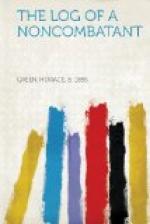Such a spirit, and with it a sincerity of purpose that could only come from the conviction of right, is typical of the rank and file of citizens. It cannot fail to impress the neutral stranger, though he has traveled far in other countries at war and seen and lived with their citizens and soldiers. One was forced to believe that the militarists acted in conformity with the feelings of the whole people, and that this hideous war was not merely the result of personal ambition. Except, of course, among the soldiers the belief was most noticeable among the lower classes. One found it among the peasants, one’s neighbor in the day coach, the artisan, the shopkeeper. You might reason with a professor, a doctor, or perhaps an official in the Foreign Office at Berlin. But it was not safe to try it on a sturdy peasant with three sons on the firing line. It was like telling a man his mother is no better than she should be.
From the Log
“Among both fighters and those left at home, there is distinctly less of the matinee hero business than in either England or France. The high official in the civil government who said that the women were the best fighters in the German army was not so far from the truth. The pluck of the women is astonishing. There isn’t the slightest display of sorrow or call for sympathy. You see them everywhere in the streets, cafes, and shops of Berlin; not in such great numbers, however, as in the lesser provinces and the smaller towns, where the drain of men is enormously heavier.
“Later: Have been twice to the Casualty List Office, or Information Bureau, where the names of the verwundet und gefallen are posted — column after column, company after company, regiment after regiment of fine black type—nothing more or less than a printer’s morgue, crowding into one dark hallway the cemetery of a nation. There were fathers, mothers, brothers, and children quietly and unemotionally scanning the lists. It took me back to the terrible week at the White Star offices, after the Titanic went down. At that time the relatives wept (some of them) and nearly all harangued the officials, asking questions, sending telegrams, begging for news. Here they look for the names of their dead,—that’s all,—and then go out without a question. You can’t ask questions of a Government! The Titanic lasted a week, and this goes on— God knows how long!
“Had supper with Brown. Later a mother in black and a girl, also in black (the daughter, or daughter-in-law, I should judge), came into the Heiniger ( ?) Cafe while I was sitting there. For three quarters of an hour they listened to the music, neither of them, I’ll swear, speaking a word. Then they paid twenty-five pfennigs for their beer and went out, —still silent,—and the Ober bowed low and very respectfully. I asked the waiter who they were, and he said the woman had that day heard of the death of C... her fourth son. Something like the Bixby woman to whom Lincoln wrote his famous letter. And there must be, literally, thousands of them.




